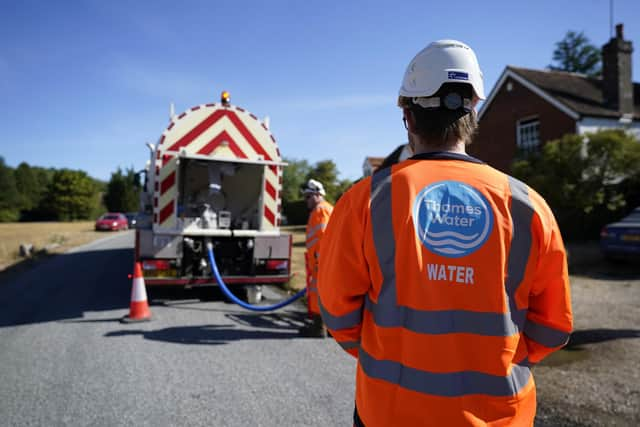Thames Water crisis shows why arguments for industry staying private are draining away: David Behrens
Thames Water is facing down a debt pile of £14bn and it will likely be only a matter of time before it sinks under the weight.
The company’s £1.6m-a-year chief executive, Sarah Bentley, jumped overboard without warning on Tuesday, just three years after being handed £3.1m as a “golden hello”. It was yet more money down the drain.
Advertisement
Hide AdAdvertisement
Hide AdIf her ship goes down, the ripples could capsize vessels closer to home. The regulator Ofwat has already said it is concerned about the financial resilience of Yorkshire Water, amongst others.


So it’s not surprising that contingency plans are being drawn up in Whitehall to deal with the emergency nationalisation of one or more of these companies. I don’t know about you but I’m not completely reassured by that. We all know what happened last time the government prepared for an unforeseen disaster.
But why is the water industry insolvent when so much money is sloshing around within it? Why was it necessary this week for companies to threaten to hike their bills by 40 per cent to pay for fixing the sewage crisis? Isn’t that exactly the situation that the privatisation of 1989 was designed to avoid?
The Thatcher government believed that private companies would finance investments in infrastructure without the burden of public borrowing. They would bring commercial know-how to get things done more efficiently, while the new regulator would prevent them from abusing their market power. It was a model that had worked for telecommunications so why not water?
Advertisement
Hide AdAdvertisement
Hide AdLots of people told them why not. Water was a public utility whose engineering had remained basically unchanged since Victorian times. Deregulation was never going to turn it into a consumer product, as had happened almost overnight with the phone network. And water was a natural monopoly; there was little commercial incentive to invest or innovate.
And so it has proved. While the network of leaky old pipes got older and leakier, money poured out of the network and into the hands of institutional investors – £18bn in a single decade. Thames Water was paying its shareholders £100m even as Ofwat was investigating its failure to control leaks. And in a betrayal of the principles on which it was founded, it took on extra debt to reduce its tax bill while ratepayers were left to underwrite improvements.
Not even Rebecca Pow, the Environment Minister, could put a convincing spin on the figures. “Capital investment in the water industry has been four per cent higher than it was pre-privatisation,” she told the Commons on Wednesday. It’s literally a drop in the ocean.
And she was being selective with the facts when she added that Ofwat was “working very, very closely with Thames Water”. Too closely by far, some would say. Ms Bentley’s temporary replacement is none other than Cathryn Ross, Ofwat’s former chief executive – an overseer who conspicuously failed to make the company up its game.
Advertisement
Hide AdAdvertisement
Hide AdMeanwhile, the government promised that whatever happened, water would “continue to flow” – at least until the next hosepipe ban, it might have added. At that point, turning on your sprinkler will incur a fine of £1,000.
There is already a ban in Kent which David Hinton, boss of South East Water, had the brass neck to blame on people working from home. The industry is warning of bans elsewhere after what it claims was the driest February for 30 years but it’s another case of selectivity with the facts: March and April were wetter than any I can remember. So if anyone comes after my hosepipe this summer I’m going to stuff it down Mr Hinton’s trousers.
But it is the unqualified insult of using our rivers and beaches as sewers that is the most egregious violation of public trust and the one that is causing some to withhold their wastewater bills. Action groups are springing up across the country, goading the companies to take them to court – confident that they won’t dare because they would then be under oath to tell the truth. And officers of the courts tend to be a lot less compliant than Ofwat.
Anyway, it may be academic. By the time the law catches up, the water companies may all have been flushed away like sewer rats by the economic current they tried to ride. And there won’t be enough tears shed to water so much as a window box.